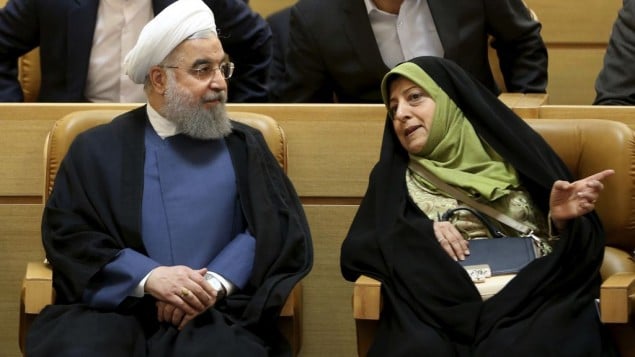Iran’s President Hassan Rouhani has presented his Cabinet for his second four-year term in office — boosting centrists and reformists, possibly sending a signal to the Revolutionary Guards, and initially snubbing women.
The centrist President, who won re-election in May and was inaugurated on Saturday, replaced 9 of 31 Vice Presidents and Ministers — less changes than the half expected by many observers — while retaining several in key posts. The centrist Bijan Zanganeh continues as Oil Minister despite sustained criticism by conservatives and hardliners, and Mohammad Javad Zarif stays as Foreign Minister after his prominent role in the 2015 nuclear deal and projection of Rouhani’s foreign policy of “engagement”. Cleric and Rouhani ally Mahmoud Alavi remains as Intelligence Minister, while the conservative Abdolreza Rahmani Fazli — disliked by many reformists — continues as Interior Minister.
Rouhani, who has been in an ongoing political battle with the Islamic Revolutionary Guards Corps, replaced Hossein Dehqan with Army Brigadier General Amir Hatami. If confirmed, Hatami would be the first officer outside the IRGC to hold the post in more than 20 years.
The President and the Guards have sparred since Rouhani took office in 2013. The conflict escalated since Rouhani’s victory in May over the Guards-backed cleric Ebrahim Raisi — the President challenged the large IRGC stake in the Iranian economy, while Guards commanders accused Rouhani of mismanagement and links to corruption, as his brother Hossein Fereydoun was arrested over claimed involvement in the “Payslips Scandal” of excessive salaries and bonuses for Government and State-linked executives.
Rouhani also replaced his Economy Minister Ali Tayyebnia with Massoud Karbasian, who had been head of Iran’s Customs Administration.
In the other changes, lifelong reformist Habibollah Bitaraf returns as Energy Minister, a post he held in the Khatami Government more than a decade ago. Another Khatami-era minister and reformist, Mohammad Shariatmadari is Industry, Mining, and Trade Trade. Mohammad Javad Azari Jahromi become the Government’s youngest minister at 36 as he takes over at the Communications and Information Technology Ministry after serving on the Iran-Russia joint communications and information technology commission.
Former Tehran Chief Prosecutor Ali Reza Avaei, sanctioned by the European Union since 2011 for violation of human rights, becomes Justice Minister.
No Women…At First
Reformists had been concerned about exclusion from Rouhani’s cabinet and a shift towards the conservatives as the President tried to fend off pressure over political and economic issues. Mohammad Khatami, the reformist President from 1997 to 2005, said on Monday:
People who put in effort for the President’s success…should not be subjected to disloyalty and rejection….We cannot say that we have an [Islamic] Republic, whilst the Islam that we offer is against the will of the people and [their] freedom.”
The regime has barred Khatami for years from any citation of his views or display of his image in the Iranian media, and he has been prevented from travelling abroad.
But while fending off the concern about a political shift, Rouhani initially disappointed many in another key area: there were no women in the Cabinet in his first set of changes.
In a later statement, two women were appointed as Vice Presidents — Masoumeh Ebtekar, prominent since the 1979 Islamic Revolution, for family and women’s affairs and Laya Joneydi for legal affairs. Shahindokht Moulaverdi, who was Vice President for family and women’s affairs, become the President’s assistant for civil rights.
Moulaverdi had said that the initial all-male Cabinet showed Rouhani was “treading water” in his commitment to political and social change.

